|
|
|
Sort Order |
|
|
|
Items / Page
|
|
|
|
|
|
|
| Srl | Item |
| 1 |
ID:
155780
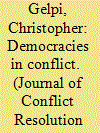

|
|
|
|
|
| Summary/Abstract |
The vast literature on the impact of democratic political institutions on foreign policy behavior has yielded some of the most important developments in our understanding of violence and war over the past thirty years. The Journal of Conflict Resolution has played a prominent role in this growth and development. Critics of the democratic peace have dismissed this literature as a correlation in search of an explanation. However, I argue that the democratic peace literature and its various descendants represent a surprisingly productive example of an empirically focused and puzzle-oriented research program that has produced cumulative scientific knowledge regarding our understanding of international politics. This sustained investigation of democracy and foreign policy has yielded an increasingly robust and sophisticated model of democratic constraint that is the consequence of a progressive research program that compares favorably to earlier research programs that emphasized clashing paradigms of international politics.
|
|
|
|
|
|
|
|
|
|
|
|
|
|
|
|
| 2 |
ID:
155783
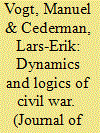

|
|
|
|
|
| Summary/Abstract |
This article reviews the literature on civil war. We focus on the most recent period of scholarly activity, beginning in the early 2000s when the publication of prominent quantitative studies triggered a surge in the empirical research of civil war as a well-defined conceptual category. We identify three explanatory logics that have dominated much of this literature and that view civil wars as a consequence of greed, grievances, and opportunities, respectively. We evaluate the arguments and findings of these theoretical approaches with respect to each of the main phases of war: outbreak, wartime dynamics, conflict termination, and postwar recovery. The article concludes by identifying key challenges confronting future civil war research. In particular, we emphasize the continuing need to advance theories that bridge the main explanatory logics as well as the different phases of conflict. Researchers should also pay more attention to defining the appropriate spatiotemporal scope of their studies.
|
|
|
|
|
|
|
|
|
|
|
|
|
|
|
|
| 3 |
ID:
155776
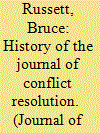

|
|
|
|
|
| Summary/Abstract |
This article examines the experience of this interdisciplinary journal dedicated to rigorous scientific research on the issues of war and peace. It opens with Journal of Conflict Resolution’s birth at the University of Michigan and then proceeds through its thirty-seven years at Yale and then to its period from 2009 to the present at the University of Maryland.
|
|
|
|
|
|
|
|
|
|
|
|
|
|
|
|
| 4 |
ID:
155782
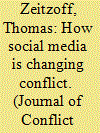

|
|
|
|
|
| Summary/Abstract |
Social media increasingly plays a role in conflict and contentious politics. Politicians, leaders, insurgents, and protestors all have used it as a tool for communication. At the same time, scholars have turned to social media as a source of new data on conflict. I provide a framework for understanding social media’s influence on conflict through four interrelated points: (1) social media reduces the costs of communication, (2) it increases the speed and dissemination of information, (3) scholars should focus on the strategic interaction and competitive adaption of actors in response to communication technology changes, and (4) the new data that social media provides are not only an important resource, but also fundamentally change the information available to conflict actors, thereby shaping the conflict itself. In sum, social media’s influence on conflict defies simplistic explanations that argue that it privileges incumbents or challengers.
|
|
|
|
|
|
|
|
|
|
|
|
|
|
|
|
| 5 |
ID:
155778


|
|
|
|
|
| Summary/Abstract |
This article takes stock of some of the important contributions to the study of peacekeeping (PK). Two key topics stand out: peacekeeping burden sharing and mission effectiveness. For burden sharing, the theoretical foundation is the private provision of public goods and joint products. Implications for burden sharing differ whether financial or troop contributions are being shared, with the latter driven by jointly produced country-specific benefits. Financial burden sharing can also differ between United Nations (UN)-led and non-UN-led peacekeeping operations, wherein country-specific benefits are especially important for the latter. Many articles gauge peacekeeping effectiveness by the mission’s ability to maintain the peace or to protect lives for a set time period. More recently, multiple criteria are raised for evaluating peacekeeping in today’s world of multifaceted peacebuilding operations.
|
|
|
|
|
|
|
|
|
|
|
|
|
|
|
|
| 6 |
ID:
155777


|
|
|
|
|
| Summary/Abstract |
Scholars interested in researching nuclear security are increasingly expressing the fear that the “important questions” have already been answered. At the same time, recent studies highlight the potential for major limitations on the ability to conduct casual inference on nuclear proliferation in particular, suggesting perhaps that we know much less than was previously believed. Although recognizing these challenges, this article argues that there remain ample opportunities to conduct innovative scholarship on questions of nuclear security. New nuclear challenges bring fresh opportunities for the next generation of research on topics including limited nuclear war; nuclear nonproliferation diplomacy; emerging technology, weapons proliferation and strategic stability; nuclear modernization and arms races; and many other issues. More precise theory, new data, and improved methods of inference also allow researchers to revisit and possibly resolve persistent debates. Although the problems confronting research on nuclear security are serious, they can be addressed. In sum, the questions in this field are so consequential that they deserve the best available analytical attention, even if the resulting answers are not perfect.
|
|
|
|
|
|
|
|
|
|
|
|
|
|
|
|
| 7 |
ID:
155781
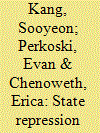

|
|
|
|
|
| Summary/Abstract |
In this article, we review decades of research on state repression and nonviolent resistance. We argue that these two research programs have converged around six consensus findings. We also highlight several areas of divergence, where greater synthesis between the research on state repression and nonviolent resistance might prove useful. We draw attention to remaining controversies surrounding the association between state repression and nonviolent resistance—particularly regarding different theoretical assumptions about structure, agency, and strategic choice; measurement challenges for both repression and dissent; methodological challenges regarding endogeneity, multicausality, and equifinality; and moral hazards associated with the study of nonviolent resistance and the effectiveness of repression. We conclude by highlighting some productive ways forward.
|
|
|
|
|
|
|
|
|
|
|
|
|
|
|
|
| 8 |
ID:
155779
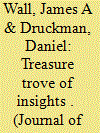

|
|
|
|
|
| Summary/Abstract |
Six decades of JCR research on negotiation and mediation are celebrated in this article. Starting with the earliest articles on these topics, we trace the development of recurring themes. The themes serve to organize a review of findings reported in the journal. The research on negotiation covers processes and conditions that occur prior to, during, and at the end of negotiation. The work on mediation provides insights into mediator approaches and impacts. This article concludes with suggestions for integrating and better understanding of the negotiation and mediation processes.
|
|
|
|
|
|
|
|
|
|
|
|
|
|
|
|
|
|
|
|
|